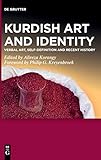Kurdish Art and Identity : Verbal Art, Self-definition and Recent History / ed. by Alireza Korangy.
Material type: TextPublisher: Berlin ; Boston : De Gruyter, [2020]Copyright date: ©2020Description: 1 online resource (XI, 214 p.)Content type:
TextPublisher: Berlin ; Boston : De Gruyter, [2020]Copyright date: ©2020Description: 1 online resource (XI, 214 p.)Content type: - 9783110596892
- 9783110598858
- 9783110599626
- GR271.K85 K84 2020
- online - DeGruyter
- Issued also in print.
| Item type | Current library | Call number | URL | Status | Notes | Barcode | |
|---|---|---|---|---|---|---|---|
 eBook
eBook
|
Biblioteca "Angelicum" Pont. Univ. S.Tommaso d'Aquino Nuvola online | online - DeGruyter (Browse shelf(Opens below)) | Online access | Not for loan (Accesso limitato) | Accesso per gli utenti autorizzati / Access for authorized users | (dgr)9783110599626 |
Frontmatter -- Foreword -- Acknowledgements -- Contents -- Applying the Oral-Formulaic Theory to Mem û Zîn -- Mem û Zîn as Court Literature -- Cleansing the Galleries: A Museum in the Imagination of Kurdish Diaspora Artists and Activists -- From Fairytale Character to Lost Goddess: The Archetypal Representation of Stepmother within Kurdish Folklore -- The Impact of the Dengbêjî Tradition on Kurdish Theater in Turkey -- Conservatives and Radicals: Ethnicity and Politics in Early Modern Ottoman Kurdistan -- The Oral Tradition of Dengbêjî : A Kurdish Genre of Verbal Art and Reported Speech -- Orality and Folklore: Reflections on the Folktale Tradition of the Zaza People -- Darceñge: A Lekī Poem by Miļā Nawshād -- Index
restricted access online access with authorization star
http://purl.org/coar/access_right/c_16ec
Folklore has been a phenomenon based on nostalgic and autochthonous nuances conveyed with a story-telling technique with a penchant for over-playing and nationalistic pomp and circumstance, often with significant consequences for societal, poetic, and cultural areas. These papers highlight challenges that have an outreaching relationship to the regional, rhetorical, and trans-rhetorical devices and manners in Kurdish folklore, which subscribes to an ironic sense of hope all the while issuing an appeal for a largely unaccomplished nationhood, simultaneously insisting on a linguistic solidarity. In a folkloric literature that has an overarching theory of poetics – perhaps even trans-figurative cognitive poetics due to the multi-faceted nature of its application and the complexity of its linguistic structure – the relationship of man (and less frequently woman) with others takes center stage in many of the folkloric creations. Arts are not figurative representations of the real in the Kurdish world; they are the real.
Issued also in print.
Mode of access: Internet via World Wide Web.
In English.
Description based on online resource; title from PDF title page (publisher's Web site, viewed 27. Jan 2023)


